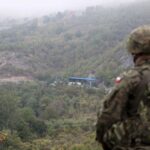CEE countries bolster defences, await diplomatic solution to Ukraine crisis
Reading Time: 2 minutesAs the stand-off between Russia and Ukraine continues, for countries within Central and Eastern Europe (CEE) it has spurred a flurry of activity, including troop movements among members of the NATO alliance to bolster their defenses. The Baltic News Network writes that Lithuania’s Ministry of Defense confirmed that a backup NATO troop contingent from Germany arrived in Lithuania last week to join the NATO enhanced Forward Present Battle Group stationed there – 1,200 troops, including 500 Germans, who join their counterparts from the Netherlands, Norway, Belgium, France, the Czech Republic, Croatia, Luxembourg and Iceland who are also in Lithuania.
Having attended an informal meeting in Paris with French President Emmanuel Macron last week, Romania’s President Klaus Iohannis said his country was ready to host a NATO fighting troop, as reported by Romania Insider. “We know where this battle group will be positioned, but [it] is not yet formally approved at the NATO level,” he said, offering that deliberations over the deployment would happen in the spring.
Prague Morning reports that Czechia’s Prime Minister Petr Fiala is convinced that any conflict between Russia and Ukraine would also affect his country, which is also pushing for diplomacy to end the crisis. “I would like to assure you that our government is prepared for this situation,” said Fiala, “that we can manage it together. We are prepared for all scenarios, whether there is a power cut or a refugee wave.” Meanwhile, the Czech Foreign Ministry has reiterated its appeal to Czech nationals in Ukraine to depart the country as soon as possible.
Meanwhile, President Macron said today he had convinced both US President Joe Biden and Russian President Vladimir Putin in principle to attend a meeting about security and strategic stability in Europe, in hopes of a diplomatic solution. The White House replied that Biden would be there only if Ukraine had not been invaded, while the Kremlin said its plans were uncertain.
European foreign ministers meeting in Brussels today approved an EUR 1.2 billion line of credit to Ukraine whose access to capital has been impeded due to the possibility of war. The first tranche of EUR 600 million will reportedly be delivered as soon as possible, writes Politico.
Source: Politico, Al Jazeera, Baltic News Network, Daily News Hungary, Prague Morning, Romania Insider

